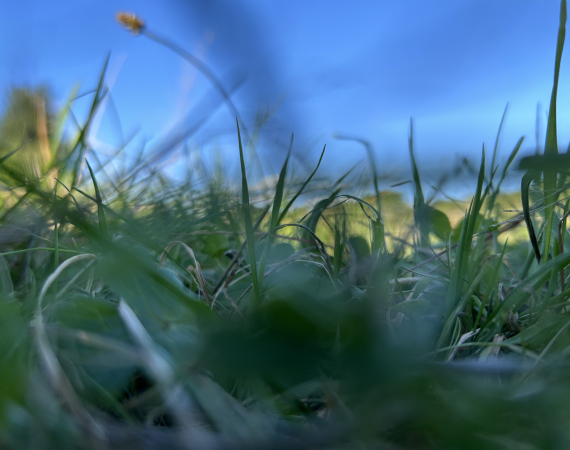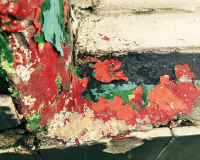Posted on Thu 6 Feb 2025
Talking About Whiteness
Starting this research journey with a personal reflection on what brought me here.

Posted by
Project

Murmurations: a mutual research exchange
Research is an earth making practice. It is about recognising that what happens to others relates to what happens to us.It began, well it probably didn’t begin but let’s come back to that, with Zahra Ash-Harper. I was having a conversation with her and Bill Sharpe, reflecting on a workshop in our Towards Equitable Futures series, and she laughed at something we were saying and asked ‘why do you people find it so hard to talk about Whiteness’?
I stayed silent then, but I am going to try and respond now. If you have spent your life watching White people like me struggle to understand ourselves and experiencing the dangerous outcomes of that struggle you may want to stop reading here. You may not want to hear my late-to-the-party reflections.
I felt embarrassed by Zahra’s question, and a bit confused and I had no idea what to say. My brain went blank but I think my stomach knew exactly what she meant. I was getting used to talking about race, and racism and to listening to Other people share their experiences but I never really said anything about me and where I came from. What really was ‘Whiteness’ apart from a thing that wasn’t Black or Brown? A kind of blank slate? A smooth piece of ground that I could stand on. So I didn’t reply and Zahra, being really too good for this world, didn’t push me.
Before I go on, I want to be clear that the notion that humanity is comprised of different races is made up. It is a myth created to separate us so that that a minority of people might violently exploit the rest, and it diminishes us all. This can be complex to navigate because while myths are made up, they are also real. They do things in the world, creating allegiances in good and bad ways. Some of those allegiances need disrupting, White people often stick together to make and police the rules. But some alliances are born of the pride, love and resistance of Black and Brown people and they demand respect. So as I am thinking about how the ideology of race plays out in practice around me, I am trying to tread carefully – to understand it without solidifying it.
Does speaking about whiteness allow it to become an ‘essential something’? If whiteness gains currency by being unnoticed, then what does it mean to notice whiteness? What does making the invisible marks of privilege more visible actually do?
Sara Ahmed, A phenomenology of whiteness 2007
Looking back on my response to Zahra’s question, I think it reveals so much. In most of my social and professional environments Whiteness is the ‘norm’. And so Whiteness makes itself undetectable to White people - positioning ‘us’ and ‘how we do things’ as just the way that things are. It affords us the ordinariness of our existence, making space for our words and thoughts and actions to be understood as coming from our own special selves. Whiteness can feel inevitable, unavoidable, inescapable and so we perpetuate it, enacting the power it gives us at Black and Brown people’s expense.
I think this is why many White people get sucked into self-pitying and defensive behaviours when our Whiteness is pointed out. Because we rarely have to think about our Whiteness, it becomes the invisible glue that holds us together. When challenged our instinct is to deflect and seek protection before we fall apart. This is perhaps especially true of middle class White Women who are used to being cast as damsels in distress. Although I hate this idea, I know I have absorbed it from a patriarchal culture that seeks to hurt and infantilise me, and then reinforced it through subscribing to a form of feminism that has largely ignored its own role in systems of oppression. I have been made to feel weak, and then encouraged to empower myself without attending to the power I already have.
I was once let through customs after a massive knife in my bag showed up on the metal detector, I mimed chopping herbs while blushing and it wasn’t even confiscated – unbelievably White. It is made so clear to me that the state assumes that I am good and I can go where I like. This comes into focus when confronted with the mistreatment of Black and Brown people I hold dear, the shame of my complicity in their pain combined with confusion about how to be of use is often mortifying. Facing up to Whiteness is difficult because it requires me to do the work of questioning so much of what I thought I knew; the expectations that I have of people, the systems that I use to get things done, the people that I look to for approval. The power that I am so easily given and how I use it. The ways in which I have also been disempowered. That smooth ground that I was standing on begins to feel very shaky.
What if looking at Whiteness meant that we could begin to let it go? To participate in a violent myth is to live already with a sense of separation, from ourselves and from our kin. To me it feels like a homesickness that is hard to identify. I sometimes find myself struggling for a truth that I can’t remember, and it feels like a betrayal of something I never believed in. Imagine the relief we might all feel, the energy that would be released, the new bonds that would form, the collective power that we would have if we could step outside of our prescribed roles.
A system that ‘builds’ you up by tearing others down, that denies the humanity of others, one that not only requires, but valorizes, the commodification of social relations, is not one that is equipped for achieving the sense of interconnectedness between ourselves and the world that is a pre-requisite of good mental health and contentment
What White People Can Do Next, Emma Dabiri
I want to talk about Whiteness in relation to my professional life as a Producer supporting publicly funded Research and Development (R&D). R&D is a process which builds on knowledge about how things work now in order to experiment with making something better. That thing might be a product, a piece of art, a technology, it might (as in Towards Equitable Futures) be a way of generating collective visions about the world we want to live in. In my work I am, with a team of Producers, trying to create the best conditions for R&D, the right container, so that what gets made moves us towards a mutually thriving future. I do that within a cultural sector, and often in collaboration with an academic sector, that remains White. That’s not to say that everyone working there is White, or that there aren’t many people trying hard to make change - but that the dominant structures are built for survival within a racist status quo. There is much testimony about how this plays out in the way that funding opportunities are designed, HR processes are enacted, meetings are facilitated and progress measured.
I am also thinking about Whiteness a lot in my home life as the White mother of a dual heritage, Black man. Not much of that belongs in this piece but I will say something because of course it is all tangled up together. I think that the connection between professional and personal here has to do with trust. At home I am working to trust myself; to feel the shame I have for the ways in which I have failed to grapple with my Whiteness and listen to what that has meant for my son. To accept that guilt but not to wallow in it, to get on with the job of being his mum - although he is grown up I want to get better at it. I think that means that in a world that won’t always show him trust, I will. I will do trust, with my heart and my head and my voice. Because there is nothing more true than him.
To parent - and nurturing the next generation belongs to us all - we must exist in a state of looking both backwards and forwards. Standing between the generations, making choices where we can about what we hand on. Like with R&D, we gather up threads of the past and try to weave them into something new.
At work, I am interested in the role of trust because Whiteness trusts certain types of knowledge, particular modes of behaviour and specific forms of value above all others. And this limits our potential to reimagine things, and explore what better looks like. I am learning to see how Whiteness is a process of using up the world. I mean this materially, it was invented to prop up the extraction of global resources by and for European powers – feeding our hungry systems of production – and continues to drown out other ways of organising human society. Gender, class, dis/ability, sexuality and age all have their part to play within a structure of Whiteness that attempts to define and separate us. And within that British Whiteness is something in particular, a potent mix of multiculturalism and empire.
Humans are not divided biologically into distinct continental types or racial genetic clusters. Instead, the Western concept of race must be understood as a classification system that emerged from, and in support of, European colonialism, oppression, and discrimination. It thus does not have its roots in biological reality, but in policies of discrimination. Because of that, over the last five centuries, race has become a social reality that structures societies and how we experience the world.
American Association of Biological Anthropologists, 2019
The R&D systems that my work is a part of were built on these foundations, dominated by a ‘move fast and break things’ culture that found fevered expression in Silicon Valley and has pervaded how innovation is understood in the UK. I have felt this appetite at work in many rooms I have been in. White people (myself included) have often performed Whiteness by fuelling expertise that comes from a European academic tradition while devouring that which doesn’t, eating up more than our fair share of time and money while withholding opportunity, and celebrating experimentation without noticing where the risk really lies and who ends up depleted.
The ways in which White people benefit from a system of racialised hierarchy have been extensively proven. Whiteness is bestowed upon some of us by state and society, it is made real through the songs we are sung, the tales we are told, the potential we are assumed to have. The images we are shown of who lives and who dies. It offers some of us a lot of freedom but it is also a trap. It undermines our humanity because ultimately, our freedoms are deeply intertwined.
I have been reading, paying close attention to relationships around me, having conversations, walking and doing some writing. I have been challenging myself around White feminism and femininity in particular, a pillar of my identity that needs some serious attention. I have been taking my time. I have been in profound dialogue with Dr Erinma Ochu whose ideas, ways of working and trust in me have expanded my horizons immeasurably. I have been figuring out what things I can do for myself that gently challenge the ways in which my body has absorbed structures of power so that I am more open to change.
I am beginning to uncover what research into the ways in which Whiteness monopolises R&D resources might look like for me. I want to better understand how things operate now, and then I hope to work alongside others to experiment with creating technologies of solidarity. I have begun to think about where the body ends and technology begins, about whether the material of our professional lives can be rewritten in a way that centralises love, and about what it means to make a home where people feel they belong. I am taking the question of where I am from, and what I might become into that work.
Each of us tries to understand and organise the world by looking through our own lens, which simplifies what we see. But by using love as a tool, this lens can be widened to take in more of human complexity. People are changed by people, not by thoughts alone but by the heart. Love is one of those things that is not clearly understandable; it lets us leap over the boundaries of right and wrong, dialectic and division. It enables us to im-agine a future where we’re together again, where we find each other again, so that we can start to imagine that future into being.
Zahra Ash Harper, Producing inclusion with Three Horizons
These emerging thoughts depend very much on the insight of others (see below for a list of some of the texts that have I have been learning from). I hope to share more as I continue this research but my focus will be on doing, undoing, relating, trusting. The active and ongoing effort is in figuring out, in loving solidarity, what I do to try and create a different kind of container for our work. A container that is expansive and porous, one which isn’t afraid to get complicated but where there is joy and laughter, one where people encounter lives different to their own and yet feel the truth of their connection, a space in which people are unafraid to build from what they feel as well as what they know and out of which strange and wonderful things emerge. I don’t know what those things might be, but that’s okay because the point is not to create a singular vision of the world – but to trust that we can make it together.
All about love: new visions, bell hooks
Digital Black Feminism, Catherine Knight Steele
What White People Can Do Next, Emma Dabiri
A dangerous game....the technologies of empire, Erinma Ochu
This work isn’t for us, Jemma Desai
Black Feminist Thought: Knowledge Consciousness, and the Politics of Empowerment, Patricia Hill Collins
White Privilege: Unpacking the Knapsack, Peggy McIntosh
Race after Technology, Ruha Benjamin
Against White Feminism, Rafia Zakaria
Institutional As Usual, Sara Ahmed
The Bluest Eye, Toni Morrison
The Carrier Bag Theory of Fiction, Ursula Le Guin
Out of Whiteness, Vrin Ware and Wes Back
Producing inclusion with Three Horizons: pp 41-64, Zahra Ash-Harper and Bill Sharpe
My heart felt appreciation goes to Erinma, Zahra and Sebastian who also offered valued feedback on this piece (though any mistakes are my own!). And I’d like to thank Furaha, Fozia, Asmaa, Alexie, Tanuja, Adibah, Prince, Ayan, Imwen, Lawottim and Tony for their wisdom.
